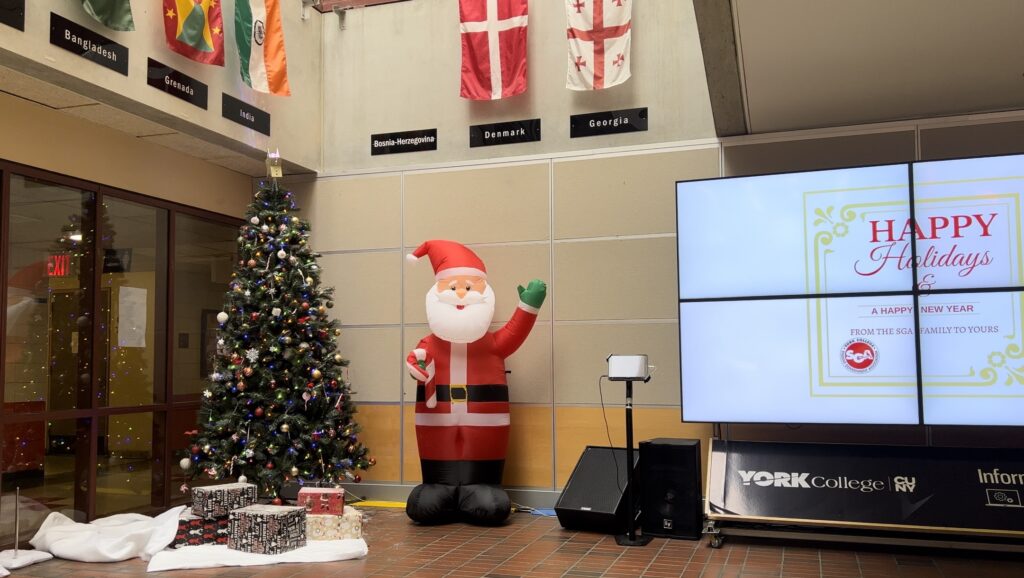
By Shemiza Basdeo
Christmas is a widely known holiday that is celebrated amongst all kinds of people all over the world. It is a time when people honor and celebrate the birth of Jesus Christ by giving gifts, going to church, spending time with family and friends, while eating good food and sweets. Many families have their sacred and intimate traditions and customs that they take part in for this holiday. It is a time when happiness, joy, and love spread like wildfire and engulf you in the holiday spirit.
Professor Clare Masullo, a faculty member in the Teacher Education department expressed how she is going to spend Christmas in her new home and how she is looking forward to decorating her house both inside and outside to feel the vibes of Christmas. She said that Christmas day is dedicated to spending time with her loved ones so she is going over to her parents’ home. Masullo also said that on Christmas Eve, she plans to stay home and watch Christmas movies all day long. She hopes for a calm and quiet Christmas this year with her loved ones.
Asha Narain, an early childhood education major, explained that her family and herself takes off from work and spends the day with each other. Narain also spends Christmas day with her in-laws, and said they would all cook a dish and take it to her in-laws. The foods that they cook are Guyanese culture-based foods, like duck or goat curry, with rice or roti. The desserts are either flan or cakes. In addition, Narain explains how they all buy gifts for everyone and after eating, they all sit together and open their gifts. Narain believes that Christmas day is meant to spend with family, eating foods that compliment their culture, and giving and receiving gifts.
Anjali Rafaqat, an english education major, said her family starts Christmas day by yelling “Merry Christmas!” to each other. Then, they run downstairs to their Christmas tree and tear open their gifts. She explained her family cannot contain their excitement or eagerness, so before they do anything, they open their gifts to see what they all received. Rafaqat explained how afterward her family takes out pictures of themselves in their festive pajamas to always have the beautiful memories of their annual Christmas mornings. After taking pictures, her family prepares a big Christmas dinner, and invites other family members and friends to come over to eat and spend the day with each other. Lastly, their tradition is to end the night by playing Christmas songs, chatting with each other, and eating desserts. Rafaqat says that “Christmas is one of the best times of the year.”
Professor Lisa Dunn-Lockhart, a faculty member in the teacher education department, explained that her mom flies in from North Carolina and her dad will face time from Jamacia. She said that Christmas night is when all of her family members come together to have a big dinner, play fun games, and spend quality time with each other. One of her ongoing traditions for Christmas day is that each year one family member is given the responsibility to hosting Christmas night. She loves to give out souvenirs to her guests to commemorate the holiday.
Aarti Maharaj, an English major and an education minor, explained that she spends Christmas day with her daughter. Maharaj states that as a new mother, she is trying to come up with new traditions and customs to make the holiday meaningful for her daughter. She makes sure to put up the Christmas tree and read Christmas stories to her daughter each night.
Additionally, to making sure her daughter gets the most out of the holiday, Maharaj also said that she loves giving back to her community. For instance, she likes to participate in donations to help out kids.
“As a future educator, I want to instill values in my daughter that Christmas is not about receiving but more about giving, said Maharaj.
To end the semester, York’s Student Government Association had its annual holiday lighting ceremony. Members of the SGA lit up a Christmas tree and a candle on the Menorah for Hanukah. Professor Andrew Jackson held a presentation on the meaning of Kwanza during the ceremony. According to Jackson, Kwanza is not a religious practice but rather a cultural celebration. He went on to say that everyone can be a part of Kwanza by following the seven principles: unity, self-determination, collective work or responsibility, cooperative economics, purpose, creativity, and faith.
“We may share different traditions during this period but at York, we try to be inclusive so that everyone leaves with good memories,” said Nish-Hoa Mullings, president of SGA.

